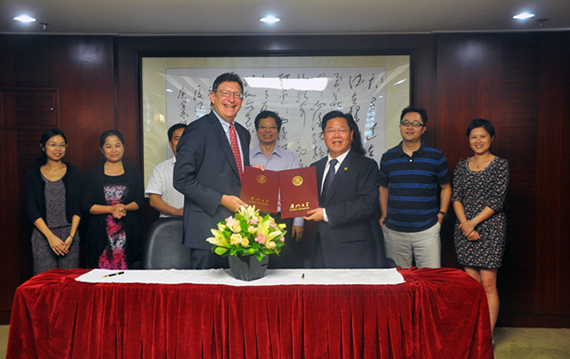In another move designed to broaden Colgate’s international reach and recognition, President Jeffrey Herbst has signed a memorandum of understanding with Xiamen University in China (XMU). On behalf of their respective institutions, Herbst and XMU President Zhu Chongshi enthusiastically agreed to “promote cooperation and the advancement of academic and educational exchanges.”
Herbst was warmly received at XMU when he visited this week. He gave a seminar on Africa’s economic development prospects and signed copies of his latest book, Africa’s Third Liberation. He also addressed about 400 students who were curious about the American liberal arts system and potentially interested in participating in a new four-week cultural exchange program at Colgate.
“There seems to be real demand,” Herbst said about the cultural exchange program, which will be the first cooperative effort resulting from the agreement.
Beginning in summer 2013, the program will bring dozens of XMU students to live and study on the Colgate campus. For academic credit from Xiamen, enrolled students will study English; attend talks and lectures on American culture, government, and economics; and be exposed to a variety of cultural experiences. There will be field trips in the region as well as overnight trips to New York City and Washington, D.C.
Cheryl Long, associate professor of economics and director of Colgate’s Asian Studies Program, is now serving as a visiting faculty member at XMU’s Wang Yanan Institute for Studies in Economics. While attending a conference there three years ago, she observed a natural synergy with Colgate and since then has helped shepherd the relationship along.
“The two schools, although different in size, share quite a few common features,” she said. “Both were established by philanthropists and have long histories (with XMU, as one of the first private universities in China, founded in 1921). Both value academic excellence and are ranked among the very top in their respective country for excellence in teaching and research. And both share the view that globalization is the defining feature of the new century and universities should become more internationalized.”
XMU has an enrollment of more than 38,000 full-time students on campus, including 20,575 undergraduates, 15,590 master students, 2,567 doctoral students, and about 2,500 international students.
In May 2011, professors Long, Graham Hodges, and Robert Garland visited XMU, funded by Colgate’s initiative to expand the scope of internationalization. Though Hodges had lectured there in the past, Garland was pleased to discover a stunningly beautiful and well-endowed campus whose main draw, he believed, would be engagement between faculty at the two institutions.
Garland said: “We certainly came away with the impression that Xiamen would among other things be an ideal university to match with Colgate faculty in the hope of doing a joint colloquium, and even perhaps down the road collaborative research.”
